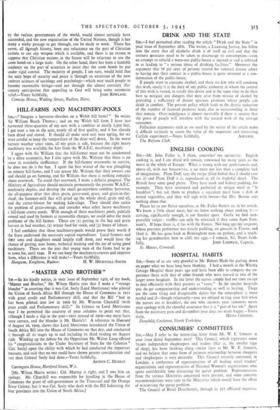HILL-FARMS AND MACHINERY-POOLS Sta,—" Imagine a harvester-thresher on a Welsh
hill farm! " So writes Sir William Beach Thomas ; and on my Welsh hill farm I have just harvested three-quarters of my oats with a combine at nearly 1,300 feet. I got over a ton to the acre, nearly all of first quality, and it has already been dried and stored. It should all make seed oats next spring, for we were careful to keep the temperalure of the drier well down. In the worst harvest weather since 1920, all my grain is safe, because the right heavy machinery was available for hire from the W.A.E.C. machinery dep6t.
I agree with Sir William that the hill-farmer must not be condemned by a mere economist, but I also agree with Mr. Walston that there is no sense in avoidable inefficiency. If the hill-farmer overworks to survive, he does not do it for fun. I spent the first winter of the war ploughing on remote hill-farms, and I can assure Mr. Walston that their owners can and should go on farming, and Sir William that there is nothing romantic about overwork. To avoid that overwork, I make a definite proposal. The Ministry of Agriculture should maintain permanently the present W.A.E.C. machinery depbts, and develop the small go-anywhere combine harvester, the all-purpose drier that dries grain, grass-seed, grass, and grain-in-the- sheaf, the hammer-mill that will grind up the whole sheaf, grain and all, and the cutter-blower for making kale-silage. They should also tackle the problem of grain-storage, and consider what other heavy machinery a hill-farm centre needs. With enough of these machinery pools, publicly owned and used by farmers at reasonable charges, we could solve the main problems of the hill farmer. These are (r) getting in the hay and grain harvest in bad weather, (2) winter feed for stock, and (3) hours of labour.
I feel confident that these machinery-pools would prove their worth if the State undertook the necessary capital expenditure. Local farmers and their sons and daughters could largely staff them, and would have the chance of getting, near home, technical training and the joy of using good machinery. These are the joys that young men of the farms had to go to town for, until 194o. If we can keep the machinery.-centres and improve them, what a difference it will make!—Yours faithfully,


























 Previous page
Previous page